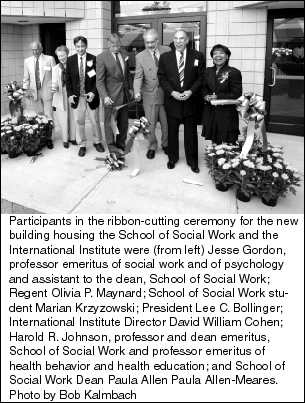The University Record, September 30, 1998
Social Work, International Institute celebrate new beginning
By Jane R. Elgass
 Several hundred alumni, donors, representatives of community agencies and students gathered Sept. 25 for the formal dedication of the School of Social Work Building, which also houses the International Institute.
Several hundred alumni, donors, representatives of community agencies and students gathered Sept. 25 for the formal dedication of the School of Social Work Building, which also houses the International Institute.
President Lee C. Bollinger said the new building “is one of the most important points of the University” in offering a face to the world. The growing International Institute, “representing the hub of our activities abroad,” and the School of Social Work, “the premier school in the country, are an important part of the face of the institution.”
The 122,000-square-foot building, with much-needed classroom space and possibly the largest social work library in the world, offers the School of Social Work a new beginning for its “community of researchers, scholars and learners,” Dean Paula Allen-Meares said. She offered a “bold vision,” enabled in part by the new home. Elements of that vision include:
–Revitalization of the social work profession through interdisciplinary inquiry, research and information technology.
–Creation and advancement of knowledge that will include national and international collaborations.
–Strengthening of education at the master’s and Ph.D. levels by integrating interdisciplinary perspectives, research, scholarship, technology and practical application.
–A focus on the application of technology in the delivery and management of social services and in lifelong learning.
–Improvement of the well-being of the economically and socially disadvantaged by using a proactive, preventative approach to achieve a more just, equal, healthy and productive society.
–Enhancement of the School’s reputation as a national and international leader.
“There were moments that I thought this opportunity might never be here,” Regent Olivia P. Maynard told the audience, citing the efforts of Allen-Meares and Dean Emeritus Harold Johnson, along with dedicated volunteers and donors. She noted that the building offers more than physical enhancement of the campus; it offers a place where students and scholars can work to understand the issues of social justice.
An alumna of the School, Maynard noted that her time here was “special. I got to study in the Frieze Building, where even the clean dirt offered a perfect training field” for future social workers. The current students are at a “true disadvantage,” she quipped.
The new facility offers the School of Social Work a “sense of professionalism” that the Frieze Building lacked, student Marian Krzyzowski said, adding that students and scholars alike should “take advantage of their new home to work for social justice.”
Cohen noted that almost exactly five years ago (Sept. 24, 1993) the Regents approved the establishment of the International Institute, which has brought together the University’s “distinguished centers of learning and training” and made the U-M a leader in the “revaluation of context-based training and scholarship.”
The move to the new building, Cohen said, “positions us strategically among the nation’s finest schools, [but] in the face of a changing world, this is only a beginning.”
“We would delude ourselves if we did not recognize the enormous challenge that lies before us in determining what this great University must do to establish leadership in international education.”
The University “is at the cusp of implementing effective approaches to learning and mastering of languages spoken around the globe,” Cohen noted. “We must make this happen to assure that Michigan grads will produce positive change in any and every setting.”
The U-M must “seize the opportunity to produce double professors who will be able to work across the globe” and must work to “maintain an edge in the newly emerging complex international fields.”
Lastly, the University must acknowledge the timeliness and urgency of the current international arena and the expertise it can provide in international public policy.
“No institution on this continent,” Cohen said, “is more poised or perhaps more looked to, to lead higher education toward a more powerful international address.”
You can always drop us a line:

